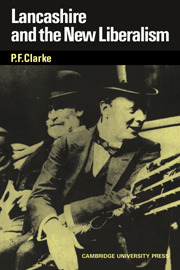Book contents
- Frontmatter
- Contents
- Preface
- Abbreviations
- Dedication
- PART ONE INTRODUCTION
- PART TWO FORMATIVE INFLUENCES
- PART THREE THE TERMS OF THE CONTEST
- PART FOUR THE RECONSTITUTION OF LIBERAL LANCASHIRE
- PART FIVE FIELDS OF RECRUITMENT
- 10 Communal politics
- 11 The rise and fall of the Free Traders
- 12 Labour
- PART SIX GOING TO THE COUNTRY
- PART SEVEN CONCLUSION
- APPENDICES
- Bibliography
- Index
11 - The rise and fall of the Free Traders
Published online by Cambridge University Press: 23 November 2009
- Frontmatter
- Contents
- Preface
- Abbreviations
- Dedication
- PART ONE INTRODUCTION
- PART TWO FORMATIVE INFLUENCES
- PART THREE THE TERMS OF THE CONTEST
- PART FOUR THE RECONSTITUTION OF LIBERAL LANCASHIRE
- PART FIVE FIELDS OF RECRUITMENT
- 10 Communal politics
- 11 The rise and fall of the Free Traders
- 12 Labour
- PART SIX GOING TO THE COUNTRY
- PART SEVEN CONCLUSION
- APPENDICES
- Bibliography
- Index
Summary
We Unionist Free Traders must fight on as best we can and at any rate go down with our flag flying. One thing I will not do, however, and that is either by word or deed admit that those are true free traders who confine their observation of free trade principles to exports and imports and violate those principles in the most cynical way in all the other departments of public activity.
St Loe Strachey, 1909It is usually asserted that the Liberals did well in Lancashire from 1906 because of Free Trade: with the implication that laissez-faire Liberalism enjoyed a freak revival. On this reading, the Liberal party remained essentially a bourgeois instrument and the millowners rallied to it in defence of the precepts of the Manchester School. Now this chapter will not seek to deny that for many Lancashire men Free Trade was the most fundamental of political truths, nor that Lancashire as a whole was unenthusiastic about Tariff Reform. But, whatever was the case in 1906, it is grossly misleading to attribute the Liberal victories of 1910 in any significant degree to the businessmen's preference for Free Trade. Far from fiscal attitudes dictating party allegiance, it would be truer to say that party allegiance dictated fiscal attitudes.
This chapter will examine the behaviour of two sorts of men, those who were nominally Liberal and those who were nominally Conservative. In practice they were much of a muchness.
- Type
- Chapter
- Information
- Lancashire and the New Liberalism , pp. 274 - 310Publisher: Cambridge University PressPrint publication year: 1971



